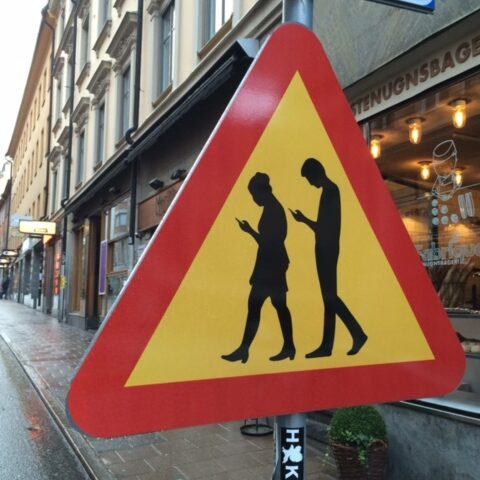“Welcome, it’s been a while.” I smile at the conference hostess at the conference center north of Stockholm. I’m there to write on one of my books, which feels like the most useful task I can devote myself to, since my voice is not well enough to lecture this week. On the way up to the room, I notice that the place is crowded with conference attendees. But I also notice that most people don’t talk to each other or even take in the beautiful surroundings and the inviting fireplace in the entrance. They are busy checking their cell phones. It is tough to impress your colleagues, when competing against a world of interesting information that is only a swipe away. With a huge cup of coffee and many cookies I lock myself into my meeting room. Opening the computer I am just about to get started when I glance at my phone. Or should I check Twitter first?
“Swedish neuroscientist Katarina Gospic compares our smartphones with a bowl of candy.”
This week I’ve been quiet most of the week to rest my voice. My husband has not suffered at all from my lack of communication. On the contrary, he’s looked happier than ever. I missed not being able to meet my dear participants, who instead got the privilege of meeting my professional colleagues. But other than that it has been surprisingly easy to be quiet. Researchers claim we prefer texting each other or adding a comment on any social media, to talking to each other. Research also shows that many suffer from FOMO – fear of missing out – and therefore find themselves checking their smartphones up to 150 times per day. Using some common sense that sounds crazy, given that it can take up to 25 minutes before we recover from the distraction and have full focus on whatever we were doing again. But our brain loves rapid rewards. As soon as we receive a text message, “like” or fun photo on Instagram the entire reward system in our brain is running wild with excitement. Swedish neuroscientist Katarina Gospic compares our smartphones with a bowl of candy. Just as it is hard to just take one piece of candy, it’s hard to just look once and then resist your smartphone. What if we miss out on something? Have humans gone from being Homo Sapiens to being Homo Fomos?
FOMO is a form of social anxiety
FOMO is a form of social anxiety, an obsessive worry that you’ll miss an opportunity for social interaction, a new experience, a profitable investment or some other satisfactory event. A recent study shows that FOMO is most common amongst people with unmet psychological needs of being loved and respected. FOMO is particularly associated with mobile phones and social media. We all know at least one or several people who are victim to compulsively checking social media. There may be friends, family members and even colleagues who spend an endless amount of hours sharing and communicating through social media. Although we all may suffer researches believe that some people are more vulnerable to FOMO than others. It may not be a coincidence that several actors in Hollywood have dusted off their earliest versions of mobile phones. Suddenly they can only be reached via telephone and text message (not smoke signals and drums though). People confess to having so much more free time and inner peace since they liberated themselves from their addiction of smartphones.
But do we really need to go back to “the stone age” to be able to cope with our modern life? After all, our rectangular companion makes life so much easier. Countless times it has helped me finding my way, reminding me what to buy in the store and smoothly scanning my bills. The list of everyday efficient features on my smartphone could be made infinitely long. However, I fully respect that it also means that I am constantly carrying around a bag of candy for my brain. In the same way we’ve been taught that sweets should not be excessively consumed, we need to beware of the temptations with a smartphone. The risk is also that it lures us into a digital social environment where we drool more of other people’s lives and forget being part of our own. Imagine a world where we are afraid of missing out on something while all we are missing out on is our own lives.

How to avoid becoming a Homo Fomo:
1. Set aside
Many participants describe a relief from having banned phones from the dinner table and the bedroom. Several also confess that it has improved their love life. Others describe how they are calmer in the morning from not having the phone bedside their bed. “Before I reached for my smartphone as soon as I woke up, and scanned through how the rest of the world was doing, instead of being present with myself and my family.”
2. Things are seldom as they seem
On the outside it may look like people have a “perfect” life. It is more obvious to post photos from vacations than pictures from quarrelling with our partner (could be extremely funny though… or not). We need to keep a healthy perspective when we surf around looking at the tweaked photos we choose to show of ourselves.
3. The grass is greener where you water it
Instead of constantly comparing your life with other people, focus on your own life and what you want out of it. Also enjoy the moments you share with others “IRL” (in real life). Be thankful for what you have. When we are grateful for something, we shift our focus from shortage to abundance mindset. That is a real mood booster. What are you grateful for in your life right now?
4. From insight to inspiration
Use the insights of FOMO as an inspiration for a better quality of life. What do you long for in your life? How could 2016 be the year when you become a bon vivant? Book that dream trip. Take a “staycation” and enjoy a holiday at home. Start painting, dancing, drinking tea. Move to Paris. Whatever it is, make a plan to reach your dream. Make room on a wall for insightful goals and put up pictures, words, things that inspire you.
5. Bide your time
Just because others post their travel pictures and all kinds of activities, it does not mean you have to rush off to anything just to be “like everyone else”. Saving your money, dreaming, longing and biding your time for a dream experience or a dream journey will get you there. The experience will last from the moment you start planning and longing until they day you are at the retirement home bragging about it. This way, you’ll get value for your money and your experience to last for a longer time.

Whether we are Homo Sapiens, or feel like a Homo Fomo, with the fear of missing out, we are a species of the human race whose reptilian brains are struggling to cope with the modern digital life. Our ancestors lived for millions of years in Africa and in groups of between 50-70 people. It was only a 100,000 years ago a bunch of them began moving their way up through Europe. Our reptile brains have inherited desire for sun, talks over the campfire, dancing and funny stories. So why don’t you light some candles, invite someone to dance and spread your smile like rays of sunlight over someone – in real life.
Wishing you a sunny weekend
Petra Brask, Time Management expert, author and speaker
Never be afraid to laugh at yourself after all, you could be missing out on the joke of the century.
- Dame Edna Everage







